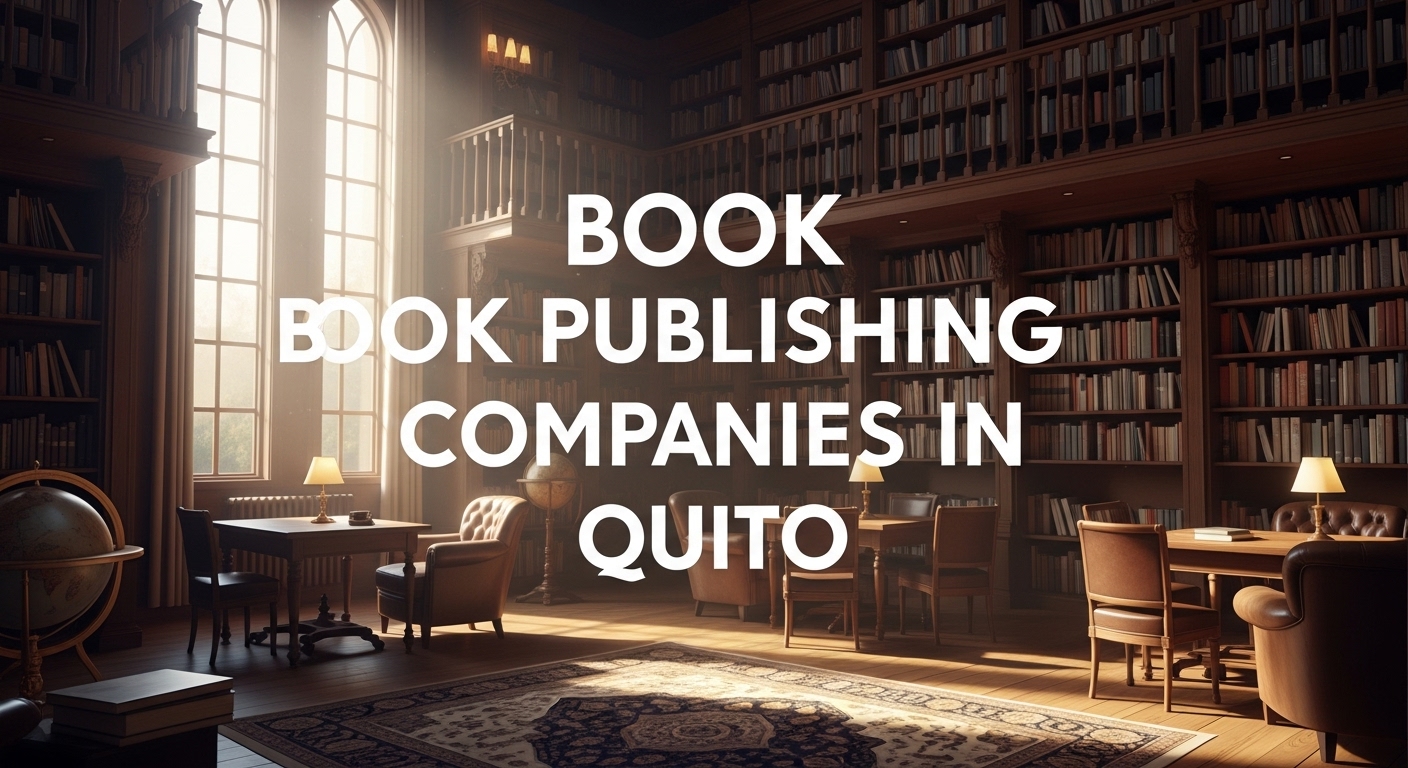
Quito, Ecuador’s capital city, is not only the political and cultural heart of the country but also a vibrant hub for literature and publishing. Over the past few decades, the city has grown into a center where traditional publishing houses, independent presses, and international service providers coexist, supporting writers across genres and languages. In 2025, the publishing industry in Quito reflects a rich combination of history, innovation, and accessibility. From academic presses and indigenous-focused publishers to children’s literature specialists and global agencies like Barnett Ghostwriting, Quito offers opportunities for authors to see their work brought to life. This article highlights the top 10 book publishing companies in Quito for 2025, giving authors insight into the key players shaping the literary scene.
1. Barnett Ghostwriting
Barnett Ghostwriting, though global in its reach, has established itself as a prominent publishing service provider in Quito’s evolving book industry. Positioned as a publisher that merges traditional publishing structures with modern author services, Barnett supports Ecuadorian writers in reaching both local and international audiences.
- Services include ghostwriting, editing, book formatting, and publishing.
- Distribution networks extend beyond Quito, connecting authors with U.S. and European markets.
- Works across genres including fiction, non-fiction, memoirs, children’s books, and academic material.
Barnett’s presence in Quito in 2025 is especially valuable for emerging authors who want a balance between creative freedom and professional publishing expertise.
2. Corporación Editora Nacional
Corporación Editora Nacional is one of Ecuador’s most respected publishing houses, with a legacy rooted in cultural preservation and the promotion of national identity. Based in Quito, it has become an anchor for authors who want their work tied to Ecuadorian heritage.
- Publishes works in history, politics, and cultural studies.
- Maintains a catalog that reflects Ecuador’s diverse voices.
- Serves as a platform for established and emerging Ecuadorian authors.
The company’s role is not just to publish books but also to ensure Ecuador’s cultural legacy continues to reach future generations.
3. Editorial El Conejo
Editorial El Conejo has carved out a niche in children’s literature and educational publishing. Its illustrated books, stories, and textbooks have found their way into schools and homes across Ecuador.
- Specializes in children’s stories, picture books, and creative learning materials.
- Encourages literacy and imagination among young readers.
- Known for high-quality design and engaging visuals.
By 2025, Editorial El Conejo remains a leading choice for authors who want to inspire children and contribute to the nation’s educational resources.
4. Libresa (Librería y Editorial Sarance)
Libresa, also known as Librería y Editorial Sarance, is a publisher with a versatile catalog that includes fiction, children’s literature, and anthologies. Its ability to balance popular literature with academic and cultural contributions makes it stand out in Quito’s publishing landscape.
- Publishes literary fiction and anthologies of Ecuadorian writers.
- Has a strong presence in children’s literature.
- Contributes to both national and international book fairs.
Libresa’s reach across genres makes it a valuable option for authors with diverse works.
5. Editorial Eskeletra
Editorial Eskeletra is a smaller independent press known for its bold and innovative approach to publishing. It provides a platform for experimental fiction, poetry, and art-related works.
- Focuses on fresh, alternative literary voices.
- Publishes poetry collections and avant-garde narratives.
- Appeals to niche audiences and creative communities in Quito.
By supporting non-mainstream authors, Eskeletra has become a vital part of Quito’s literary diversity.
6. Editorial Abya-Yala
Editorial Abya-Yala is widely recognized for its specialization in indigenous studies, anthropology, and cultural heritage. It has contributed significantly to Ecuador’s academic and cultural publishing.
- Publishes works on ethnography, sociology, and indigenous languages.
- Offers a platform for indigenous authors and researchers.
- Collaborates with universities and cultural organizations.
For authors and scholars focused on cultural identity and social sciences, Abya-Yala continues to be a cornerstone in Quito’s publishing sector.
7. Editorial Universitaria (Central University of Ecuador)
Editorial Universitaria, the publishing arm of the Central University of Ecuador, plays a crucial role in supporting academic research and scholarly works.
- Publishes academic journals, textbooks, and monographs.
- Serves as a bridge between the academic community and the public.
- Promotes works in sciences, humanities, and social studies.
As universities expand their research output, this press remains essential for ensuring academic work reaches wider audiences.
8. Fondo de Cultura Económica (Quito Branch)
The Quito branch of the Mexican publishing giant Fondo de Cultura Económica (FCE) brings international resources to Ecuador while supporting local initiatives. Its catalog includes literary works, academic publications, and translations.
- Provides Ecuadorian authors with access to broader Latin American markets.
- Offers high-quality publications in philosophy, history, and literature.
- Acts as a cultural link between Quito and the Spanish-speaking world.
In 2025, FCE continues to enhance the visibility of Ecuadorian writers abroad.
9. Casa de la Cultura Ecuatoriana Publishing Division
The Casa de la Cultura Ecuatoriana (CCE) is an iconic institution in Quito dedicated to preserving and promoting Ecuador’s cultural and artistic output. Its publishing division plays a major role in this mission.
- Publishes Ecuadorian literature, historical studies, and cultural works.
- Provides a stage for both established and new authors.
- Actively participates in national cultural events and fairs.
The CCE ensures that literature remains a central component of Ecuador’s cultural identity.
10. Editorial Planeta (Ecuador Branch)
Editorial Planeta, one of the largest publishing groups in the Spanish-speaking world, has a branch in Quito that extends its international reach into Ecuador.
- Publishes a wide range of genres including bestsellers, non-fiction, and literary works.
- Connects Ecuadorian writers with global Spanish-language readers.
- Maintains strong distribution channels and marketing support.
By combining global infrastructure with local opportunities, Editorial Planeta continues to be a powerful player in Quito’s publishing market.
Why Publishing in Quito Matters in 2025
The publishing industry in Quito reflects both tradition and innovation. Several factors make it unique in 2025:
- Cultural Identity: Many publishers in Quito focus on preserving Ecuador’s indigenous, historical, and cultural heritage.
- Education: Children’s and academic publishers play a key role in shaping future generations.
- Global Reach: International publishers and service providers like Barnett Ghostwriting and Editorial Planeta help Ecuadorian authors reach audiences beyond national borders.
- Independent Voices: Small presses like Eskeletra showcase experimental and alternative writing that keeps the literary scene fresh.
Quito stands at the crossroads of local identity and global opportunity, making it a fascinating city for authors and readers alike.
Comparative Publishing Costs & Benefits in Quito 2025
| Publisher / Service | Estimated Cost (USD) | Key Benefits | Ideal For |
| Barnett Ghostwriting | $2,000 – $10,000 depending on services | Full-service publishing, editing, distribution, ghostwriting support | Authors seeking international exposure |
| Corporación Editora Nacional | Low to moderate | Cultural recognition, national identity focus | Writers of history, politics, and culture |
| Editorial El Conejo | $1,500 – $5,000 | High-quality children’s books, school distribution | Children’s authors, educators |
| Libresa | $2,000 – $6,000 | Fiction, children’s stories, anthologies | Fiction writers & literary authors |
| Editorial Eskeletra | $1,000 – $3,500 | Experimental publishing, indie recognition | Poets, avant-garde writers |
| Editorial Abya-Yala | $1,500 – $4,000 | Indigenous and social science focus, academic prestige | Researchers & cultural authors |
| Editorial Universitaria | Low (university supported) | Academic credibility, research dissemination | Scholars and academics |
| Fondo de Cultura Económica | $2,500 – $7,000 | International network, Spanish-speaking world access | Authors seeking Latin American reach |
| Casa de la Cultura Ecuatoriana | $1,000 – $3,000 | Strong cultural visibility, national events | Authors of literature and heritage |
| Editorial Planeta | $3,000 – $12,000 | Global presence, bestseller potential | Commercial authors & mainstream works |
Conclusion
Quito’s publishing landscape in 2025 offers an exciting mix of tradition, innovation, and global connection. From established names like Corporación Editora Nacional and Editorial Abya-Yala to children’s publishers like El Conejo and international giants such as Planeta, authors have a wide variety of options. At the same time, independent and creative presses add diversity, ensuring every voice has a place. With Barnett Ghostwriting at the forefront of modern service-oriented publishing, Quito is proving itself as a city where literature thrives, stories are preserved, and new ideas are born.





